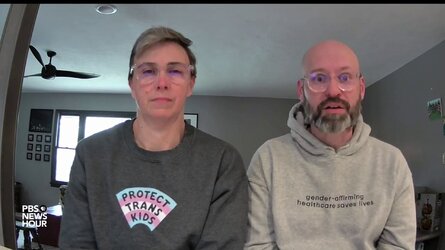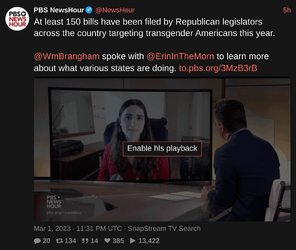- Joined
- Apr 22, 2022
Parents concerned as new state laws restrict rights of transgender children | PBS NewsHour (archive)I heard some faggot talking about trannies from the other room, and i walk in to my living room and who do i see on PBS newshour but Erin Reed himself.
To give a flavour of the tone of the whole segment:

Here's a video containing just Tony's part, starting at 05:08 in the full segment.
Transcript:
William Brangham: So, those families are clearly watching these laws and are deeply concerned with what they might mean for their children.
For more on what the various states are doing, I'm joined now by Erin Reed. She's a researcher who tracks transgender legislation around the country and advocates for trans rights.
Erin Reed, thank you so much for being here.
There are so many states that are proposing these different kinds of laws. Broadly speaking, can you explain, what are these laws generally trying to target?
Erin Reed, Erin in the Morning: Yes, thank you for having me on.
There are over 400 bills that I'm tracking that target the LGBT community primarily, the trans community. And a good third of them target the medical care of transgender youth and, in some cases, transgender adults.
They essentially will ban things like puberty blockers, hormone therapy, and, in some cases, surgery from this population. And, in many cases, they will tell doctors precisely how they should medically detransition these transgender youth by withdrawing them from their medications systematically.
And so that's what I'm tracking. And that's what's moving around the country right now.
William Brangham: And, generally speaking, some of these have passed into law. Some of them are still just in the legislature.
What are the penalties for people who break those laws, for doctors or families or individuals?
Erin Reed: Yes, so they tend to vary.
In some cases, it's a revoker of licensure. In other cases, they are felony bans, like in Alabama. In some cases, there have been times where they floated child abuse provisions, where, like, for instance, in Texas, last year, whenever Governor Greg Abbott began investigating the parents of trans teens for child abuse.
And so we have got a broad range the way that the community is targeted by this legislation.
William Brangham: We should say, for the record, that this is care that is widely accepted by most major medical organizations, pediatric organizations, that study this.
But what are the arguments that these legislators are making as to why they want to pass these bans?
Erin Reed: The arguments that I tend to see within the actual legislative hearings tend to be around, the kids are too young to choose and things like that.
And I think that, also, they tend to float surgeries. And we often hear a lot about transgender surgeries done on minors. And there's often very little time spent by the proponents of this legislation on puberty blockers and hormone therapies. And I believe that that's intentional.
Surgeries are perhaps a little bit more extreme and, therefore, easier to sell than puberty blockers and hormone therapies.
William Brangham: In fact, one of my colleagues, Laura Barron-Lopez, spoke with a legislator in Tennessee.
This is Speaker of the House Cameron Sexton. He supports one of these laws, and I want to play a clip of what he has to say. He equates gender reassignment surgery with child abuse, and argues that people who undergo that surgery, 80 percent of them later regret it.
Here's a little bit more of what he had to say.
State Rep. Cameron Sexton (R-TN):
There's a difference between a child who is younger than 18 making that decision compared to someone who's an adult making that decision.
And so we're going to err on the side of saying, if you're an adult, and that's what you want to do, go at it. But, as a child, you're telling me that a 10-, 11- and 12-year-old child absolutely knows what gender that they want to be. I do not believe that. That decision should be left later in adult life.
William Brangham: Erin Reed, what do you make of that argument?
Erin Reed: The idea that transgender youth are being treated abusively by their parents, I think, is — stands in stark reality to some of the clips that you had played earlier as well as the testimony that I have seen at these hearings.
I'm — I watched a testimony in Nebraska where the mother of a transgender teenager spoke about how, for years, she was worried that she would come home and find her child dead. And then, after allowing transition, by going through an intensive medical process with therapists, doctors over the course of a few years, she stated, while pleading for her medical care for her child, that she went from having a depressed, suicidal teenage boy to a happy, thriving, successful teenage girl, a daughter.
And this particular representative mentioned something like 80 percent of people detransitioning. And these are the kinds of things that we hear that just are not borne out by reality. These numbers are often based off of data that are decades-old from back in the '80s and '90s, whenever transgender people could not be in public, we could not exist in public safely.
And so, yes, of course, rates of detransition were so much higher back then because we were not allowed to be ourselves. And the idea that we would treat these parents as abusers and take their kids away from them, it's heart-wrenching.
William Brangham: Why do you think we are seeing all of these laws occurring across the country?
Erin Reed: There has been a sustained fear campaign waged against the transgender community and the LGBTQ community as a whole.
For the better part of two years now, we have heard the groomer slur. We have heard that we are dangerous around kids, that children should not be exposed to LGBTQ people, LGBTQ topics, identities, that we're dangerous in bathrooms, that — and I think that this fear campaign that has been waged has gotten through and has been utilized in a political manner.
And it's unfortunate, because it's targeting families that very clearly care deeply about their kids, that are following the best medical guidelines that they know how, that are working with their care teams, doctors and therapists, and that are seeing the results in their kids, that are seeing the improved lives and the ability of these kids to express themselves and be themselves.
William Brangham: All right, Erin Reed, thank you so much for being here.
Erin Reed: Thank you for having me.

@NewsHour, tweet 1631074617409273858 (archive)
Last edited:








